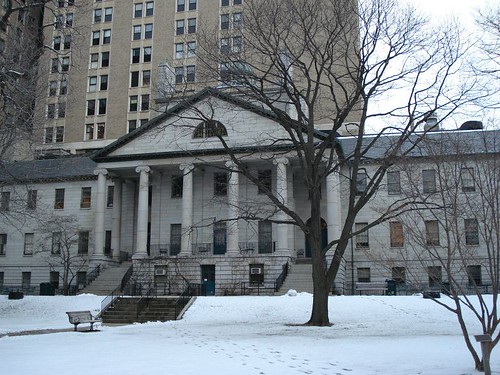When I was admitted to the hospital for my second surgery, my middle-aged roommate immediately turned her face from me. "Pull the curtain!" she instructed my nurse in a surly tone.
I quickly decided that the closed curtain was fine with me. I had no need to admit such an unpleasant person into a life that felt, at that moment, difficult enough.
However, after Ted left, it became harder to ignore the woman behind the curtain. She argued noisily with her boyfriend on the phone, then slammed down the receiver. When she refused to answer his repeated calls, her angry, self-satisfied refusal--and the constantly ringing phone--jangled in the space between us.
"Get me something to eat!" she bellowed to the front desk, after ringing her call light.
However, when the aide appeared with the liquid diet I knew all too well, she was infuriated.
"I said I wanted something to eat--not this shit."
"It's what your doctor ordered," the aide explained, politely setting down the tray.
"Then get the order changed, and bring me a goddamn turkey sandwich--on white bread!" my roommate railed. I expected the unnaturally green jello and the broth to hit the wall at any moment.
But to my amazement, within a half hour," the woman who said no" had been served another meal--including a turkey sandwich on white--just like she ordered it.
"What idiot brings a turkey sandwich without mayo?" she said, in place of thank you. The aide and I exchanged a look
But a moment later, the mayo appeared.
In the course of the day, I heard my roommate say no to the boots that stimulate circulation after surgery. "They're effing hot. You wear them if they're so great," she yelled at the nurse.
She also refused to get up and walk, though the nurses repeatedly and patiently explained how important it was for her healing. Eventually they stopped asking.
I pretended the curtain between us was as thick as the Berlin Wall. On my side, I read, talked with my family on the phone or with the nurses I'd come to know in my first visit to the floor, and tried not to think too much about what would happen the next day.
But at three in the morning, I broke.
My roommate had called for pain medication in her own imitable way. But once again, she was unhappy with what her doctor had ordered.
"No Percocet!" she shouted. "I want Dilautid!"
Assuming, as I often do, that "orders" are unimpeachable, I figured we both were in for a long night after she refused the Percs. She had already begun to moan with theatrical gusto.
A short time later, the nurse returned with her drug of choice.
Well, that did it. It was three in the morning, and my roommate obviously had no desire to speak to me, but I couldn't remain silent.
"I have to admire your ability to say no," I said--and in many ways, I meant it. "I thought the only possible answer around here was 'okay.'"
"Yeah, I been listening to you," she snorted. "I bet you've been walked on your whole life."
Hmmm...I contemplated that.
Then she asked me about my upcoming surgery. Apparently, our lives had permeated the curtain more than either of us cared to admit.
"I'm cancer free for over a year," she said. "I beat it and you can, too--if you stop being such a wimp."
I contemplated some more...
The next morning, just before my surgery, the nurse came in and said she was being discharged.
"What if I'm not ready to go?" she asked.
"I'm sorry," the nurse said. "Do you have clothes to wear home?"
"No, I came to the hospital naked," my roommate snapped and turned her back.
Only after the nurse left did she begin to cry. She was still in a lot of pain, she said; and there was no one at home to take care of her.
She rang the call bell repeatedly, complaining about pain, an inability to stand or make it to the bathroom. She couldn't possibly go home; she wouldn't.
A short time later, the orderlies came to wheel me to surgery. Since her back was to the wall, I assumed my roommate was sleeping.
But just as I reached the door, she called out to me. "Hey, good luck, okay?"
I thanked her and told her I would see her when I got back.
However, when I came in from the recovery room, her bed was made up and empty as if she'd never been there.
I continued to think about her though--about the power and limitation of the "no" she used so frequently. I wondered what her life was like, and if she really had no one at all to help her out.
And though I did not envy her life, I learned something from her. On my last day in the hospital, the nurse came to give me one of the painful heparin shots I'd been receiving twice a day.
Their purpose is to prevent blood clots. And since I was taking long, frequent walks in the halls (wanting to see the Charles River!) I didn't really think I needed them.
"What if I said I didn't want it?" I asked the nurse, covering my arm with my sleeve. "What if I just said 'no?'"
"You could do that, I suppose," the nurse said, withdrawing the dreaded needle. "I'll mark you down as non-compliant."
Non-compliant. It's something I've rarely been called, but on that morning, it felt like an unexpected victory.
You do not need to leave your room. Remain sitting at your table and listen. Do not even listen, simply wait, be quiet, still and solitary. The world will freely offer itself to you to be unmasked, it has no choice, it will roll in ecstasy at your feet. --FRANZ KAFKA
Sunday, December 30, 2007
The Woman Who Said No
Wednesday, December 26, 2007
THE VIEW FROM MY WINDOW (Hospital Thoughts 3.)
This was the view from my room during the second week I spent in the hospital. To the left, I could also see the Tobin Bridge. When I walked the long hall to the other side of the building, which I did as soon as I was able, I could see the Charles River, slowed by glittering ice floes, and beyond it Boston's gritty, elegant skyline. Since I was a child, the sight of that skyline has always excited me, and it still did. But this time it had become a kind of moving picture--one I could see, but could not enter. I looked on it--and on my own recent active, happy life--with nostalgia and awe.
In the moving picture outside the hospital, people navigated the badly plowed streets and sidewalks on their way to work. They went through the motions of holiday shopping with the usual joy and frustration. They ducked into Starbucks across the street for a respite from the cold, or grabbed a drink at the Harvard Gardens. Ted and I had stopped there one afternoon after a particularly grueling appointment. The french fries were deliciously crispy and there was jazz on the stereo.
Inside the hospital, a different kind of life went on. The second night I was there, they wheeled in a new roommate. She had been hit by a car in the crosswalk of a city street, and had several broken bones. It took thirty-six hours before an operating room was available to repair her badly shattered ankle.
Though she was Chinese, and there was something of a language barrier between us, we became a great consolation to one another. Late at night, when they finally turned out the lights, we would share our litany of suffering, taking turns in the dark. We didn't so much complain of our pain, as speak of it with wonder.
Weren't we supposed to be outside, among the crowd in the street? Weren't we part of the moving picture that is life? How had we landed here? Surely, there was some mistake.
Every night ended with the same question. "Why are we suffering?" my roommate would ask.
"I don't know," I'd say. "But we just have to accept it."
The last night I was there I was almost asleep when she asked her question. I was too tired to respond, but she no longer needed to hear my voice. I had begun to coast into a dream when I heard her answer herself three times.
Don't know; just have to accept.
Don't know; just have to accept.
Don't know; just have to accept.
In her voice, the words sounded like a kind of poem, the limited human answer to so much of the mystery that is life.
Outside, the snow continued to fall, and people continued to travel through the moving picture in the street, eager to get where they were going. My friend and I, temporarily stopped by pain and indignity and tedium, were them. And they, whether they knew it or not, were us.
It's something I hope I don't forget.
Thursday, December 20, 2007
UPDATE
Many thanks and much love to everyone who has sent good wishes, cards, prayers, and gifts. I hope to be home and up to writing more on Saturday afternoon.
BLISS to all as you celebrate the holidays!
Sunday, December 09, 2007
2. On Homesickness
Every night in the hospital, a member of the housekeeping crew would stop in my doorway to chat. His subject was homesickness, a topic that was particularly resonant for me, since I, too, was longing for the familiar clang and clatter of home.
My friend was from Colombia. He'd been in the U.S. for twenty-two years and his children had been born here. Still, when he went to sleep every night, he dreamed of his old home in Medellin, a place he could only afford to visit every few years.
"Every night for twenty-two years!' he emphasized.
But wasn't Medellin home of the drug cartels? One of the most violent cities on earth?
"No!" he insisted, the violence had abated in recent years; and besides, that had never been his Medellin. His city was the city of eternal spring where the weather is always magnificent. His city was the place where neighbors sat on their stoops and laughed together at night, a place where street festivals lasted all night, and everyone--young and old--came out to dance.
His Medellin was a place where colors were brighter, where food had more taste, and you couldn't walk through the neighborhood without hearing the sound of music.
He spoke so passionately about his lost home that for three nights I dreamed I was there, dancing all night at a street festival, wandering through neighborhoods transformed by vivid color and music.
But on the fourth night, when he stopped to talk about how much he missed his family, how a brother had died while he was away, and he'd never had an opportunity to attend the funeral, my own homesick dreams also took a turn.
That night I dreamed of my first home, of the trees outside the closet-sized room with the pink rose wallpaper where I spent my childhood, and the scent of lilac in the spring. In the next room my parents argued and loved, dreamed and worried. Our lives there, now vanished, seemed as solid and indestructible as those tall oaks and catalpas outside my window. When I woke up, the feeling of being in that house were so real that it seemed impossible that I could never return. That it had become a lost kingdom.
My last night in the hospital I watched for my friend from Colombia, but he didn't appear. Apparently, it was his night off. He was probably spending it at home with his wife, and with the daughters who considered the U.S. home--the oldest one a nursing student, the younger one earning straight As in private school. For them, my friend said, he had given up his home.
Still my homesick dreams continued. But this time they were filled with the sounds and colors of the life I live now: my daughter coming in from her student teaching every day, tired but full of stories, my son's inexhaustible guitar, ordinary days spent writing, and hanging laundry, and having dinner with Ted. My own version of the "place of eternal spring"--even in New England winter.
The next day I was released to that old life, but with a new sense and appreciation for its precariousness, its preciousness, with a new sense that even this beloved time and place will one day be a house where the door is locked to me forever.
Thursday, December 06, 2007
TEN THOUGHTS FROM THE HOSPITAL

The Garden of Shimmering Peace, originally uploaded by patryfrancis.
1. THE RELEASE FORM
As I went through a series of tests after my diagnosis, I promised myself I would not fear surgery. Surgery meant bright yellow, high flying hope. "No surgery" on the other hand (at least, in my case) meant "no point." And truthfully, I didn't fear the operation. Though I was given valium and told that no one sleeps the night before surgery, this lifelong insomniac slept deeply and well. I rode to the hospital in a state of calm anticipation
In pre-op, I was prayed over by the chaplain; and when Ted came in to say goodbye to me, there was something I can't describe-- a depth in his eyes--that I'd never seen before in twenty-six years. Something had changed between us because of this crisis; something had grown.
But it wasn't until my bed had been parked outside the OR and someone realized I hadn't signed a release form that I really contemplated what was about to happen to me--and my own vulnerability before it. As the anesthesiologist read the lists of risks--beginning with a dislodged cap in a tooth when the breathing tube was inserted and culminating in death, I hesitated, pen in hand.
"Well, are you going to sign?" the anesthesiologist asked.
"I'm thinking about it," I said. Then we both laughed. As if I had an option...
But the truth was I really did think about the possibility that when I went under, I would never wake up. It may have been remote: I was relatively fit, the hospital was world class, and I had full confidence in my surgeon. Still, it was there.
And in that moment of hesitation, I decided that if it happened, I was ready. I don't mean that in a negative, defeatist way. No, I desperately wished for more days and minutes and years--and what's more, I believed I would have them. But if I were to die that day, I was prepared. What that meant for me was quite simple: I was at peace with everyone in my life (not always possible, I know, and not always true for me.) In the previous week I had given my "I love you" to everyone in my world freely and often. I'd also spent a lot of time in contemplation.
The moment of hesitation passed. I signed my name. Then the door to the operating room swung open and I encountered the huge probing lights, the sterile atmosphere, the masked surgical team. It might have been the last thing I remembered, but it wasn't...
And yet, my moment spent contemplating the risks of surgery remained with me. I wonder: if each of us had to sign a release form every day before we left the house, enumerating the dangers we might encounter, beginning with missed opportuntunities to love, extend kindness, smile at a stranger, or pursue our goals, and ending with death--all very real possibilities we face every day, would we be ready? Would we change the way we lived?


